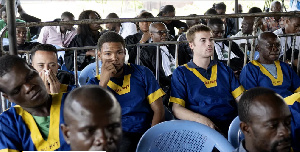Regional News of Saturday, 25 September 2021
Source: GNA
Ghana Engineer Company 9 rehabilitates dike at Kabara in Timbuktu, Mali
The Ghana Engineer Company 9 (GHANENGCOY 9) of the United Nations Multidimensional Integrated Stabilization Mission in Mali (MINUSMA) has rehabilitated an old dike at Kabara in Timbuktu, as part of its corporate social responsibility towards farmers in the area.
It was a quick impact project (QIP) under the aegis of Sector West Headquarters aimed at winning the hearts and minds of the people of Kabara, a town where the Integrated Super Camp (ISC) of MINUSMA’s Sector West is located.
A dike is a constructed elevation that runs parallel along watercourses (river, stream, etc.) intended to help regulate water levels with the purpose to protect land and property from inundation as the embankments work to prevent flooding and hold back the water gushing in from its source.
In the case of the Kabara dike, a culvert was also constructed over it to enable farmers to control the water and use it for irrigation purposes.
During the rainy seasons, the farmers have had their farms flooded due to the massive inflow of water from the Niger River into the dike and to avoid destruction of the farms they fabricated metal gates to control and direct the water onto their farms while using the water to irrigate their crops.
However, over a period of eight years since the beginning of the conflict in Mali, the dike had been inactive whilst the metal gates covering the culvert became rusty and thus could not serve their purpose as the gates were poorly fabricated and therefore could not hold the water and release it at desired times for them to use for irrigation.
To solve this problem, the farmers used sandbags to block one end of the culvert through which water flows into the other side of the dike. This rather worsened the situation as the dike gradually became silted with sand and other plastics. Hitherto, the situation kept worsening. Hence, the community called on MINUSMA for assistance, and MINUSMA added it to their QIPs list.
The Sector West Commander, Brigadier General Wael Ahmed Shawky, through the sector’s G9 Cell which supervised Civil-Military Cooperation (CIMIC) projects, then tasked GHANENGCOY 9 to undertake the project as part of its CIMIC activity.
After receiving material support from the Mission, Company 9 commenced work on Wednesday 26 May 2021 using its major equipment. The engineers dredged the dike of all debris and silt and restored it to an improved state.
The two metal gates covering the culvert were extended to cover fully from the top to the base of the culvert; thereby fittingly sealing its entrance to prevent water leakage when it is closed. By dint of hard work and professionalism, the rehabilitation of the Kabara dike was successfully completed on Thursday 27 May 2021.
It is worthy to mention that Burkina Faso Battalion provided both escort and guards to secure the grounds from threats; whilst the El-Salvador Aviation unit was on standby to provide aerial security should the need arose. This produced a conducive and secure environment for the engineers to work.
The Press and Information (PI) Cell of GHANENGCOY 9 conducted a short interview through a local interpreter and it was revealed that the farmers of Kabara were excited to see their dike and culvert rehabilitated within the shortest time.
The leader of the farmers’ association, Cooperative Agricole de Daye et Hondobomo, Alkeidi Toure expressed their satisfaction and gratitude to GHANENGCOY 9 for the rapid and prompt execution of the project.
Additionally, the G9 Cell at Sector West Headquarters in Timbuktu commended the Ghana Engineer Company for a task timely and well-executed.
Ultimately, the local farmers of Kabara now have a well-rehabilitated dike while waiting patiently to plant their crops as the rainy season approaches.
They expressed the hope that one day, through the efforts of the United Nations, peace and harmony would return to Mali with improved security and democratic systems.











